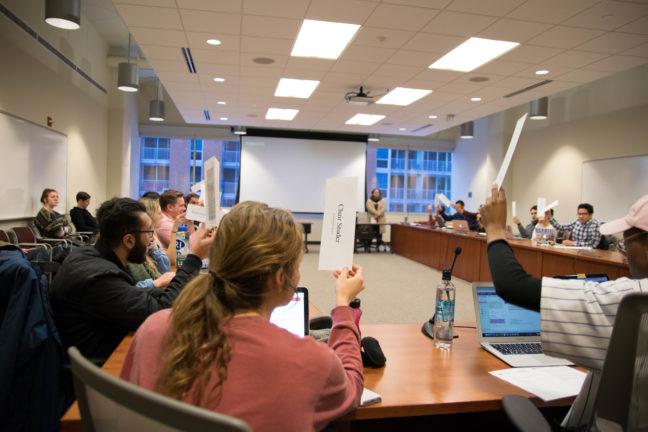There appears to be a thought in Associated Students of Madison Student Council that if you look like a government, and you act like a government, you are a government. If you hold elections, elect representatives, hold public meetings and pass resolutions, you’re golden. And if you get paid a salary by the university, well by God it feels just like the real thing.
But an imitation of a thing is not the thing itself. The limitations of Student Council in its current form are exemplified in the recent proposed (and later tabled) resolution by Student Council regarding the use of beef gelatin in Babcock ice cream. The proposed resolution sought to condemn the practice of using beef gelatin in ice cream as unnecessary and exclusionary, given that Babcock uses plant-based gelatin in some flavors already. It is a fairly reasonable suggestion — but that’s all it could ever be. Even if that resolution had passed, its function would be purely advisory. The resolution is toothless, because Student Council is not even allowed the facade of enforcement.
If we were to apply any of the standards we apply to regular governments to ASM Student Council, the conclusion would be obvious — the body has an eminently weak claim to legitimacy. First, does the government have the consent of the people it claims to represent? If we could consider election participation as a proxy — no. Despite the online convenience of voting in ASM elections, a crushing majority refused to even bother to vote — by ASM’s own count, 94 percent of eligible students. Second, does the government have the power to act on behalf of its allegedly represented population? Again, no. While ASM can apportion segregated fees, it is limited by its founding document, Wisconsin State Statute 36.09(5), to “advising the chancellor regarding … student life, services, and interests.” In other words, it has no force with which to intervene in university operations.
Voting in ASM elections imperative for representative democracy on UW campus
It is fair to say pretty much none of this is their fault. They don’t suppress voter turnout, and one can be sure they would like nothing more than for their resolutions to actually do something. But that doesn’t change the fact they continue to act as though they are doing something. By continuing to pretend as though the problems with ASM are not foundational, they keep chugging along while the whole thing starts to feel a little like “Weekend at Bernie’s.”
In Slavoj Zizek’s seminal 2012 film “The Pervert’s Guide to Ideology,” he describes a situation in late twentieth century communist countries. Towards the end of their lifespan, many of these countries entered into a state in which essentially everyone knew something was wrong — the economy was failing, things were not going well, etc. Everyone, from the highest party official to the most common citizen, knew this. But when officials spoke publicly, they would invoke concepts like “the masses” or “the people,” who, it was assumed, did not know about the sorry state of things. And as long as “the people” or “the masses” or what Zizek calls “the big other” did not know things were going poorly, it didn’t matter that, in reality, everyone else knew. Zizek postulates that in discovering that there was, in fact, no “big other,” the whole illusion came crashing down.
Such is the situation we find ourselves in with Student Council. The representatives know that it would be laughable to claim that they represent the student body when only six percent even bothered to vote for them. Surely no one in the administration could take it seriously when they know that the resolutions are non-binding and advisory. It is self-evident that no one in the general student body sees them as a legitimate source of student control on the university. Everyone knows these things. And yet no one with any power is willing to admit it, so we must uphold this sham as if it is a shining example of democracy in education, as we have seen in the Babcock ice cream legislation. That is an incredible shame.
ASM Student Judiciary General Counsel resigns, critiquing ‘issue of ethics’ in current session
We could construct institutions that bring the high politics of university administration under the control of the people it affects — students, workers and teachers. We could create a system where we wouldn’t have to beg not to be subjected to wildly unpopular proposals like the mandatory meal plan or objectionable working conditions for university employees. We should not let this lead us to apathy — we should let it inspire us to fight for something better.
Sam Palmer ([email protected]) is a senior majoring in biology.














